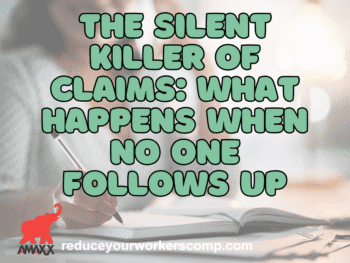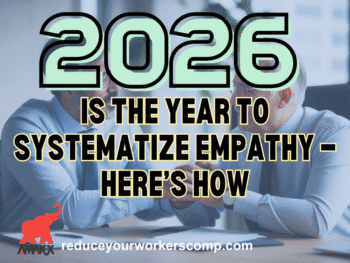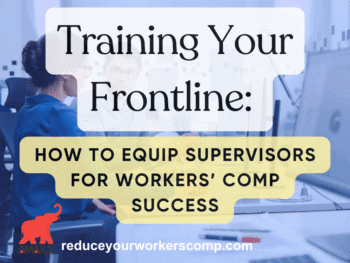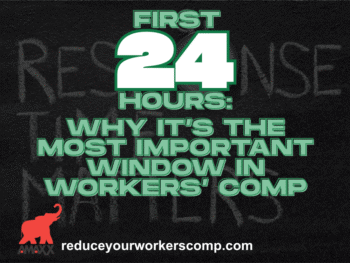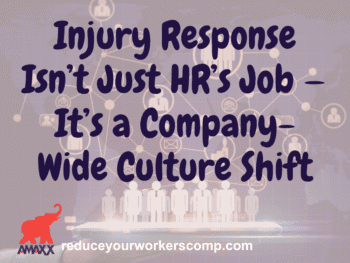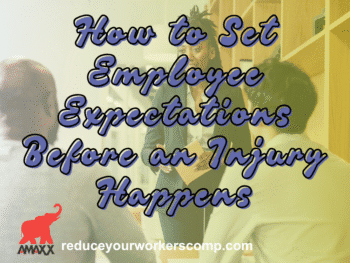Severe injuries can take a tremendous personal toll on a work force, as well as the families of the injured worker. Employers are also recognizing this grief, associated with workers compensation losses, has adverse cost impact on claims. A few cost items are, lost production, extended disability, extra medical treatment, extended weekly benefits, possible need for temporary employees, higher risks for more disabling situations, possible fraud, and potential fellow employee lost production. A total composite list of cost items, both personally and professionally, will show that the dollar value can be very large.
Types of Workers Compensation Losses Likely to Cause Grief:
Losses involving death of an employee, death of a fellow employee, a serious injury, poor injury recovery, amputations, loss of sight, loss of hearing, mental deterioration during disability, depression brought on by the injury, lengthy loss time from work, feelings of inadequacy for not being able to be a family provider, and inability to return to former occupation can bring on the grieving process.
In some instances, the death of a fellow employee can be devastating. Certain key persons or very beloved persons can leave a large void by their passing. This can cause group depression that slows production. Depending on the length of time required for the staff to recover from their grief the cost impact can be significant.
Click Link to Access Free PDF Download
“9-Element Blueprint To Create Your Workers’ Comp Employee Brochure”
Employee grief may have impact on the families, friends, and fellow associates.
The employee’s reactions to handling grief may be subtle, so may not be easily recognized. The employee is usually the last to recognize any problem. On the other end of the spectrum, employee reaction may be strong enough to warrant intervention by a medical provider, or professional grief counselor.
Catastrophic work place events caused by fire, explosion, weather, collapse, or other cause failure, can be stunning and devastating. Normal coping mechanisms for grief can totally shut down or be severely delayed. In these instances professional grief counseling is recommended.
Employer Grief Policy Steps:
When an injury involves a death there is little the employer can do to replace the loss for the family. Expressions of sympathy, offers of support, attending the funeral, providing for prompt payment of insurance, as well as corporate and legal benefits, are important as the family goes through a extremely difficult time.
Employees suffering from grief issues or problems also need employer intervention. The employer should establish a grief program that includes the following:
1. The seven step definitions of the grieving process: Acceptance, Anger, Denial, Depression, Fear, Guilt and Shock. Aside from listing their definition, be alert for their appearance.
2. Keep in constant touch with the employee during lost time disability.
3. Reinforce all positives when talking to the employee.
4. Listen and acknowledge all of the employees concerns.
5. Address all of the employees concerns within the employer’s ability to perform.
6. Share all common interests of fellow employees. Encourage fellow employees to talk to the injured employee.
7. Keep contact with the employee when returning to work.
8. If it was necessary for the employee to take another job, be sure to train, praise, and reinforce all accomplishments positively.
9. Encourage communication and show real interest in the responses.
10. Offer assistance when needed.
11. Provide professional grief counseling as needed.
12. Be sure the injured employee is welcomed back by fellow employees and made to feel part of the team again.
13. Even if the injury may preclude the employee’s participation in a group activity, extend an invitation anyway.
14. Allow and participate in fellow employee discussions about any grieving process.
Add any other steps that might be needed for employee closure. Remember, grieving employees, no matter what the circumstance, need to get their feelings expressed in order to heal, reach closure, and recover from grieving.
Summary:
The grieving process is very real. It can be triggered by many workers compensation type injuries and death. There is real increased claim cost associated with grief. An employer policy is necessary to address grief in the claim process.
Many types of trauma trigger the grieving process. When incidents are catastrophic grief can be so stunning or devastating that professional grief counseling may be needed. Compassion and real concern for all employee well-being during the grieving process is vital.
Employees who know their employer is in tune with these principals will heal quicker personally and professionally providing for increased employee morale, better production and employee stability.
Author Michael B. Stack, CPA, Principal, Amaxx Risk Solutions, Inc. is an expert in employer communication systems and part of the Amaxx team helping companies reduce their workers compensation costs by 20% to 50%. He is a writer, speaker, and website publisher. www.reduceyourworkerscomp.com. Contact: mstack@reduceyourworkerscomp.com.
©2014 Amaxx Risk Solutions, Inc. All rights reserved under International Copyright Law.
WORK COMP CALCULATOR: http://www.LowerWC.com/calculator.php
MODIFIED DUTY CALCULATOR: http://www.LowerWC.com/transitional-duty-cost-calculator.php
WC GROUP: http://www.linkedin.com/groups?homeNewMember=&gid=1922050/
SUBSCRIBE: Workers Comp Resource Center Newsletter
Do not use this information without independent verification. All state laws vary. You should consult with your insurance broker, attorney, or qualified professional.

